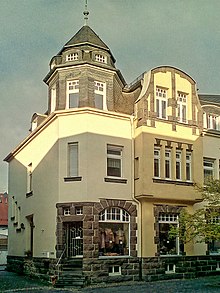Otto Bubenzer
Otto Bubenzer (born August 14, 1878 in Rebbelroth ; † April 24, 1973 ) was a German architect and civil engineer who lived and worked in the Oberbergisches Land .
architecture
Bubenzer's monumental architecture is reminiscent of Art Nouveau , but is primarily attributable to homeland security architecture . His most famous works include:
- the villa of the margarine manufacturer Carl Bubenzer in Freudenberg (Siegerland) , built in 1902,
- the observation tower in Derschlag , built in 1904,
- the Bismarck Tower in Wiehl on Engelhardt, built in 1909.
Church engagement
Bubenzer belonged to the "closed" brother movement (from 1930 as a travel preacher). After the ban on meetings in 1937 , he joined as opposed to most other leading representatives not the "Bund Free Church Christians" (BfC) at, but gathered here and there with like-minded people in the underground, for which he twice before the Gestapo -Sondergericht in Cologne answer had to. After the war he was instrumental in the reconstitution of the "closed brothers" and was one of their leading representatives until his death.
family
Bubenzer was born with Selma. Dannenberg (1884–1961) married and had four children with her.
literature
- Jürgen Woelke: Heinrich Mühlenweg (1872–1952) and Otto Bubenzer (1878–1973) - two early architects in Gummersbach. In: Gerhard Pomykaj, Jürgen Woelke (Ed.): Gummersbacher in their time. The 19th and 20th Centuries in Biographies and Memories. Festschrift for the 900th anniversary of Gummersbach in 2009. (= Contributions to the history of Gummersbach , Volume 6.) Gronenberg, Wiehl 2009, ISBN 978-3-88265-292-5 , pp. 99–110.
Individual evidence
- ^ Barbara Pankoke: The Villa Carl Bubenzer in Freudenberg. In: Denkmalpflege in Westfalen-Lippe , issue 1/2006 (online as a PDF file with approx. 3.48 MB) , p. 23ff.
| personal data | |
|---|---|
| SURNAME | Bubenzer, Otto |
| BRIEF DESCRIPTION | German architect |
| DATE OF BIRTH | August 14, 1878 |
| PLACE OF BIRTH | Rebbelroth |
| DATE OF DEATH | April 24, 1973 |
